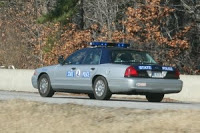 |
| image source: cliff1066/Flickr |
Madison Ruppert
Activist Post
The Virginia State Police (VSP) used automatic license plate readers (ALPRs) to collect information for a massive database detailing the political activities of ordinary, innocent people.
If this is surprising to you, it shouldn’t be, given that license plate readers are used on a massive scale in the United States. Furthermore, it is not uncommon for police to maintain and access large databases without public consent.
While the fact that the VSP used license plate scanners in 2008 and 2009 was revealed in August by a Virginia newspaper, new information has been released thanks to documents obtained by the ACLU.
The VSP captured and stored the license plates of vehicles attending events ranging from President Barack Obama’s 2009 inauguration to campaign rallies for Obama and Sarah Palin.
The database, reportedly maintained from 2010 until last spring, allowed police to “pinpoint the locations of millions of cars on particular dates and times,” Rebecca Glenberg, legal director of the ACLU of Virginia wrote.
The ACLU revealed on Wednesday that they received documentation of the VSP program in response to a public records request filed by the ACLU of Virginia.
While the ACLU recognizes some legitimate uses for ALPR data, such as checking “hot lists” of vehicles that have been stolen or used in crimes, they contend that the VSP use crossed the line.
The VSP collected personally identifying information – in this case, license plate data – on drivers only because they were attending a political event. This, the ACLU contends, is where the police crossed over the line into “oppressive surveillance.”
Privacy rights can be maintained with license plate scanners if the information about license plates not placed on a “hot list” is deleted immediately, but that is far from what happened with the VSP.
In this case, the drivers’ information was stored even though they were not even suspected of committing a crime or connected to one in any way. The only thing these drivers were guilty of was assembling peacefully and speaking freely, both rights protected by the First Amendment.
The ACLU contends that this issue is much larger than just some license plates being scanned in Virginia.
“Monitoring protests and political rallies will chill this fundamental form of expression,” Glenberg writes. “We must be able to participate in demonstrations and campaign events without fearing that our license plate will be scanned and stored by law enforcement.”
This is especially true when one considers participation in political events that might be controversial for one reason or another.
 Many people would likely avoid the risk of attending simply based on their fear of being associated with such a cause in an easily-accessed database.
Many people would likely avoid the risk of attending simply based on their fear of being associated with such a cause in an easily-accessed database.
One must also consider the implications for journalism, since reporters would similarly be associated with a particular controversial cause, speaker, party, position, etc. even if they were just attending to cover the event.
The ACLU points out that even the International Association of Chiefs of Police recognized the troubling implications of this trend.
When it comes to license plate readers, “[t]he risk is that individuals will become more cautious in the exercise of their protected rights of expression, protest, association, and political participation because they consider themselves under constant surveillance.”
Thankfully VSP consulted with Virginia Attorney General Ken Cuccinelli this year about the legality of their program.
Cuccinelli issued a memo outlining why license plate scanners should only be used “provided such data specifically pertains to investigations and intelligence gathering relating to criminal activity,” which it clearly did not in this case.
The VSP reportedly wiped their license plate database after the memo was issued and instituted a new policy that includes the destruction of data not related to an investigation within 24 hours of collection.
Still, the ACLU contends that “our lawmakers must act to clearly prohibit the VSP from resurrecting this surveillance in the future.”
I’d love to hear your opinion, take a look at your story tips and even your original writing if you would like to get it published. I am also available for interviews on radio, television or any other format. Please email me at Admin@EndtheLie.com
Please support our work and help us start to pay contributors by doing your shopping through our Amazon link or check out some must-have products at our store.
This article first appeared at End the Lie.


Be the first to comment on "Virginia state police used automatic license plate readers to build massive database of political rally attendees"